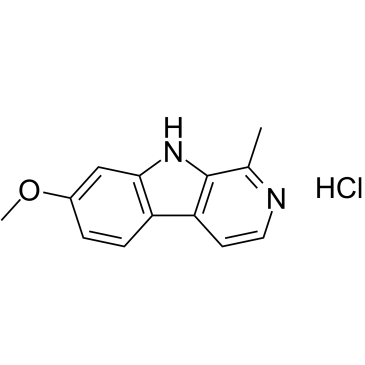343-27-1
| Name | 7-methoxy-1-methyl-9H-pyrido[3,4-b]indole,hydrochloride |
|---|---|
| Synonyms |
7-Methoxy-1-methyl-9H-β-carbolinhydrochlorid
7-Methoxy-1-methyl-9H-β-carboline hydrochloride Harmine.HCL EINECS 206-443-8 Harmine hydrochloride hydrate Harmine monohydrochloride MFCD00012641 9H-Pyrido[3,4-b]indole, 7-methoxy-1-methyl-, monohydrochloride HARMINE HYDROCHLORIDE 7-Methoxy-1-methyl-9H-β-carboline hydrochloride (1:1) 7-Méthoxy-1-méthyl-9H-β-carboline chlorhydrate 9H-Pyrido[3,4-b]indole, 7-methoxy-1-methyl-, hydrochloride (1:1) Banisterine Hydrochloride |
| Description | Harmine Hydrochloride (Telepathine Hydrochloride) is a natural dual-specificity tyrosine phosphorylation-regulated kinase (DYRK) inhibitor with anticancer and anti-inflammatory activities. Harmine has a high affinity of 5-HT2A serotonin receptor, with an Ki of 397 nM[1]. |
|---|---|
| Related Catalog | |
| Target |
Ki: 397 nM (5-HT2A serotonin receptor)[1], DYRK1A[2] |
| In Vitro | Harmine inhibits tau phosphorylation by DYRK1A by selected DANDYs, with an IC50 of 190 nM[2]. Harmine negatively regulates homologous recombination (HR) by interfering Rad51 recruitment, resulting in severe cytotoxicity in hepatoma cells. Furthermore, NHEJ inhibitor Nu7441 markedly sensitizes Hep3B cells to the anti-proliferative effects of Harmine[3]. |
| In Vivo | It is shown that brain water content is significantly increased in the TBI group. Treatment with Harmine significantly reduces the tissue water content at 1, 3 and 5 days, compared with the TBI group. Harmine treatment significantly reduces the escape latency at 3 and 5 days, compared with the TBI group. Post-TBI administration of Harmine significantly improves the motor function recovery of the rats at 1, 3 and 5 days following TBI, compared with the TBI group without Harmine treatment. The neuronal survival rate in the Harmine-treated group is significantly increased, compared with the TBI group. Administration of Harmine results in marked elevation in the expression of GLT-1, compared with the TBI group. The administration of Harmine significantly reduces the expression of caspase 3, compared with the TBI group[4]. |
| References |
| Boiling Point | 421.4ºC at 760mmHg |
|---|---|
| Melting Point | 265-270°C |
| Molecular Formula | C13H13ClN2O |
| Molecular Weight | 248.708 |
| Flash Point | 139.8ºC |
| Exact Mass | 248.071640 |
| PSA | 37.91000 |
| LogP | 3.83510 |
CHEMICAL IDENTIFICATION
HEALTH HAZARD DATAACUTE TOXICITY DATA
|
| Hazard Codes | Xn: Harmful; |
|---|---|
| Risk Phrases | R20/21/22 |
| Safety Phrases | S22-S36 |
| RIDADR | 1544 |
| WGK Germany | 3 |
| RTECS | MG9450000 |
| Packaging Group | III |
| Hazard Class | 6.1(b) |
| HS Code | 2933990090 |
| HS Code | 2933990090 |
|---|---|
| Summary | 2933990090. heterocyclic compounds with nitrogen hetero-atom(s) only. VAT:17.0%. Tax rebate rate:13.0%. . MFN tariff:6.5%. General tariff:20.0% |


